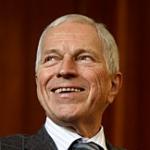Edmund Phelps

Edmund S. Phelps is a Professor of Political Economy at Columbia University and the director of the Center on Capitalism and Society at the Earth Institute. He was awarded the Nobel Prize in Economics in 2006 for his analysis of intertemporal tradeoffs in macroeconomic policy.
Edmund Phelps has expanded our understanding of the relation between short-run and long-run effects of economic policy. His contributions have had a decisive impact on economic research as well as policy. Phelps showed how the possibilities of stabilization policy in the future depend on today's policy decisions.
Phelps’s work can be seen as a program to put “people as we know them” back into economic models – to take into account the incompleteness of their information and their knowledge and to study the effects of their expectations and beliefs on the workings of markets. He has adopted this perspective in studying unemployment and inclusion, economic growth, business swings and economic dynamism.
During the 1950s and 1960s the view of a stable tradeoff between inflation and unemployment was established, the so-called Phillips curve. According to this, the price for reduced unemployment was a one-time increase of the inflation rate. Phelps challenged this view through a more fundamental analysis of the determination of wages and prices, taking into account problems of information in the economy. Individual agents have incomplete knowledge about the actions of others and must base their decisions on expectations. Phelps formulated the hypothesis of the expectations-augmented Phillips curve, according to which inflation depends on both unemployment and inflation expectations.
As a consequence, the long-run rate of unemployment is not affected by inflation but only determined by the functioning of the labor market. It follows that stabilization policy can only dampen short-term fluctuations in unemployment.
Edmund Phelps earned his B.A. from Amherst in 1955 and his Ph.D. from Yale in 1959. His career began with a stint at the RAND Corporation. Back east in 1960, he held positions at Yale and its Cowles Foundation until 1966, then a professorship for five years at Penn. In 1970 he moved to New York and joined Columbia in 1971.
Phelps was elected a Fellow of the National Academy of Science in 1982 and made a Distinguished Fellow of the American Economic Association in 2000. He also holds many honorary doctorates and several honorary professorships.
Related Links
http://www.nobelprize.org/nobel_prizes/economics/laureates/2006/
http://www.columbia.edu/~esp2/
http://www.earth.columbia.edu/ccs/